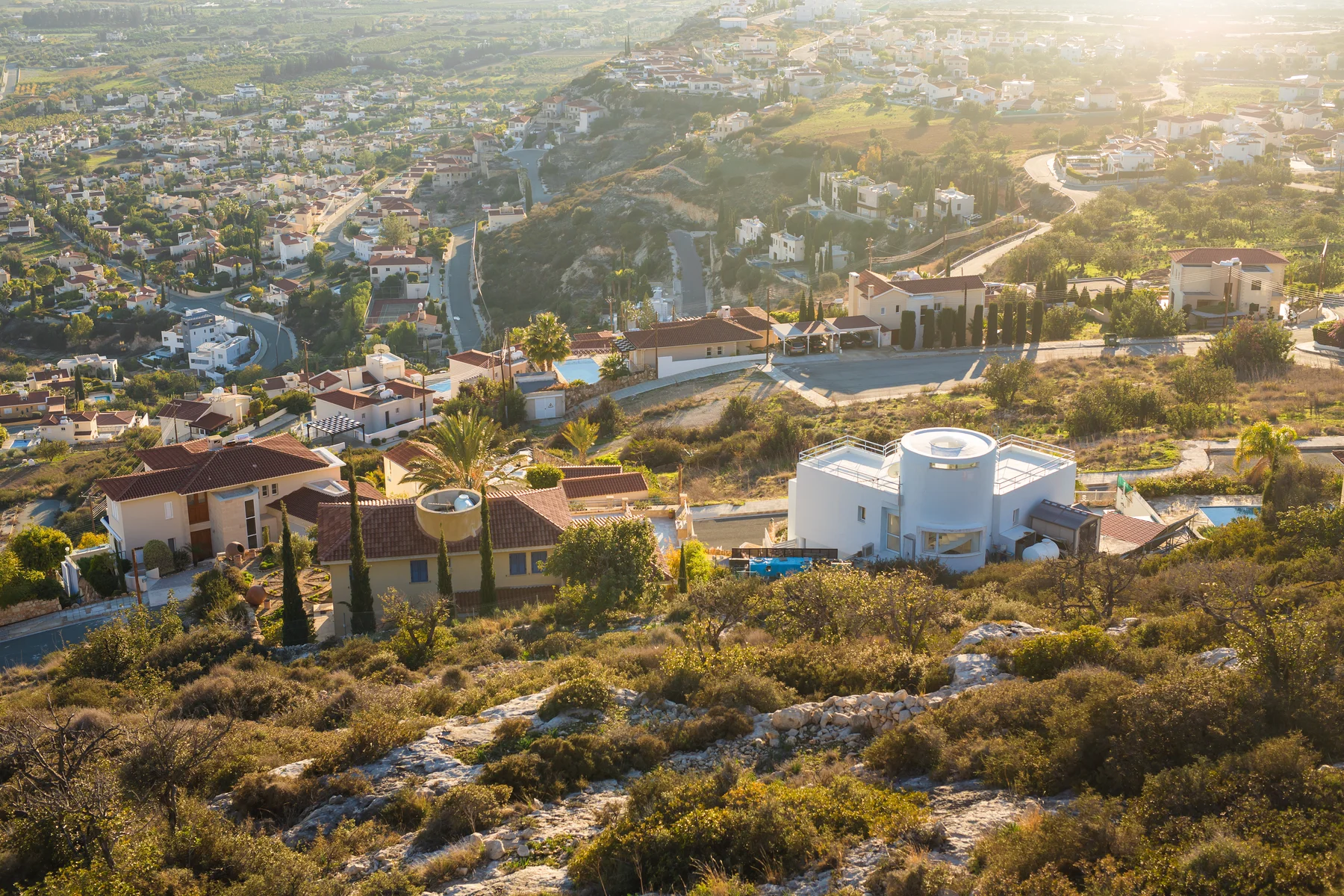
Mortgage in Cyprus. How to Take a Loan to Buy Cypriot Property
Purchasing property abroad requires significant financial investments, and tools like loans and mortgages make it possible to acquire the desired real estate right away. However, not all countries readily offer mortgages to foreigners due to perceived risks.
In the case of Cyprus, local banks are more willing to provide mortgage loans to foreign buyers, though the initial down payment tends to be higher than for local residents. The required deposit can reach up to half of the property’s value.
In this article, we will focus on the specifics of getting a mortgage for property in Cyprus, the required documentation, and the overall costs involved.
Features of Cyprus Mortgage
Non-EU foreign citizens must obtain special permission from the Cyprus Council of Ministers to purchase real estate. This requirement applies to all buyers from outside the EU, regardless of whether the property is being purchased for personal use or investment purposes. However, this process is typically a formality, and refusals are rare, occurring only in cases where the buyer has legal issues. To obtain permission to purchase Cyprus real estate, foreign citizens must provide the following:
- Application form (COMM 145).
- Copy of passport.
- Financial documents proving income.
- Property plan (if purchasing land, a copy of the building permit is required).
- Certificates of no outstanding debts or tax obligations.
The property purchase process can be completed even before receiving permission from the Cyprus Council of Ministers. Banks may proceed with issuing a mortgage, provided the permission is obtained in later stages of the transaction.
Who Can Get a Mortgage in Cyprus
Mortgages in Cyprus are available to a wide range of borrowers, including both local citizens and foreign residents. To successfully obtain a loan, one must have a stable income and a transparent financial history. The main candidates for a mortgage are:
- Cypriot citizens. As residents, they are offered more favorable mortgage conditions, with a minimum down payment of 10% of the property’s value and a simplified approval process.
- Foreign nationals. The requirements for Cyprus mortgages for non-residents are stricter, and banks typically require foreigners to cover 20–50% of the property’s initial value. For citizens of non-EU countries, some banks may also request proof of Cyprus residency.
- Legal entities. Local banks provide mortgage loans to companies registered on the island for the purchase of commercial real estate or housing for their employees.
Cyprus banks may refuse a mortgage if:
- The borrower has a low income that does not allow covering the monthly payments.
- There are overdue or problematic loans in other countries.
- The borrower cannot provide sufficient proof of income sources.
- The desired property does not meet the bank’s requirements (e.g., it is in poor condition or has unresolved legal issues).
Advantages of Mortgages in Cyprus
A mortgage in Cyprus offers several advantages, the main one being the ability to lock in a fixed interest rate for an extended period. This is especially beneficial in times of global financial instability, as it protects borrowers from potential fluctuations in rates in the future.
Other advantages include:
- Flexible loan terms. Banks in Cyprus offer a range of loan terms, from 10 to 40 years. This flexibility allows for lower monthly payments, which, by Cypriot law, cannot exceed 30% of the borrower’s monthly income.
- Purchasing property in a stable jurisdiction. Unlike many global markets, the real estate market in Cyprus remains relatively stable, especially in tourist-friendly areas. Investing in property through a mortgage allows you to preserve capital and generate long-term profit, particularly if the property is used for rental purposes.
- Simple residence permit process. Purchasing property in Cyprus with the help of a mortgage can also serve as a basis for obtaining a residence permit.
However, the key drawbacks include:
- Mortgage in Cyprus for foreigners include a higher down payment (up to 50%).
- A lengthy mortgage approval process for foreign citizens, linked to the need for thorough document and legal checks.
There are also certain risks if the buyer’s income is in a currency other than the euro. In the event of significant changes in the currency’s value relative to the euro, increasing the risk of mortgage arrears, it is advisable to contact the bank immediately. The institution may agree to a debt restructuring, which could mean revising the payment schedule, extending the loan term, or temporarily reducing payment amounts. In some cases, the bank may offer a temporary payment holiday.
It is important to approach the bank before any arrears occur, as once debt accumulates, the bank may initiate proceedings to seize funds and property belonging to the borrower within Cyprus’s jurisdiction.
What Real Estate Can be Bought with a Mortgage in Cyprus
There are no restrictions on buying property in Cyprus. Even historical properties can be bought or sold, though they come with certain nuances.
However, there are some restrictions for foreign buyers. Foreign buyers from non-EU countries can purchase no more than two different types of real estate (for example, one house and one commercial property), and the total area of these properties must not exceed 4000 square meters, as outlined in the official guidelines provided by the Cyprus Ministry of Interior.
When purchasing new properties that have not yet been used (newly built), Cyprus offers residents certain benefits, such as a reduced VAT rate (5% on the first 130 square meters instead of 19%). On the other hand, getting a mortgage in Cyprus for secondary property may incur additional costs, such as a property transfer tax.
The distinction between primary and secondary properties also affects Cyprus mortgage interest rates. You can buy an apartment with a mortgage at rates starting from 1.91% for newly built properties and up to 4.28% for secondary properties. For commercial properties, rates range from 3.98% to 5%, and the down payment requirements are often higher (typically 20–40% of the property’s value).

Requirements for Applicants and Needed Documents for Mortgage in Cyprus
As in other countries, obtaining a mortgage in Cyprus is possible under certain conditions. In addition to the standard age range of 18 to 65, Cyprus also has a requirement that the mortgage must be fully repaid by the time the borrower reaches 65 years of age. For example, if an applicant is 40 years old, they will not be granted a mortgage term longer than 25 years.
Additional requirements for applicants:
- Down payment. Banks typically require a minimum down payment of 20–40% of the property’s value. For non-residents, especially foreign nationals from non-EU countries, this deposit is higher, ranging from 30% to 50%.
- Creditworthiness. The bank in Cyprus assesses the applicant’s ability to consistently repay the loan. Monthly payments should not exceed 30–33% of the applicant’s income. This condition applies only at the time of obtaining the mortgage; if this threshold is exceeded during the repayment period but the client remains up-to-date with payments, the bank will not raise any concerns.
- Insurance. Most banks require life insurance for the borrower and property insurance (e.g., against fire or natural disasters). Annual insurance premiums vary and depend on the outstanding loan amount and the property’s value.
Main documents required for mortgage processing:
- Copy of the applicant’s valid passport.
- Completed application form provided by the bank.
- Proof of income, such as a certificate of employment, tax returns, bank statements, and documents confirming additional sources of income.
- Documents on previous loans (if applicable) and a certificate of no outstanding debts.
- Copy of the preliminary or final agreement with the property seller.
- Independent appraiser’s report on the market value of the property.
- Development plan, cadastral information, and confirmation that the property is not under lien or seizure.
Mortgage Application Process in Cyprus
Before submitting an application, it’s important to assess your financial capabilities, as Cypriot banks typically require that mortgage payments do not exceed 30–35% of the applicant’s total income. The buyer selects a property, whether it is an apartment, house, or land plot, and conducts a legal check on the property, such as requesting data from the land registry.
- Submitting a mortgage application to a Cypriot bank. To do this, a set of documents must be provided, including a passport, proof of income, credit history, and property appraisal. Non-residents are required to open a bank account in Cyprus.
- Bank assessment of the applicant and the property. The bank reviews the documents, including the applicant’s credit history, income, and other obligations. It also checks the property’s appraised value.
- Mortgage approval and signing of the contract. At this stage, the final loan amount and terms, including the interest rate and mortgage term, are agreed upon. After the loan is approved, the buyer and the bank sign a loan agreement that specifies all the loan terms.
- Mortgage registration and property purchase. After signing the agreement, the mortgage and the property must be registered with the Cyprus Department of Lands and Surveys. This step confirms the legality of the transaction and protects the rights of both the bank and the borrower. Typically, after the mortgage is registered, the remaining funds are transferred to the seller, and the transaction is considered complete.
In most cases, the bank requires insurance for the purchased property against risks (fire, natural disasters), as well as life insurance for the borrower to protect its interests in case of unforeseen circumstances.
Using an Agency to Process Documents
The process of obtaining a mortgage and purchasing property becomes easier when the buyer uses the services of an agency. The agency handles most of the bureaucratic and legal tasks, though this service comes at a cost. Legal aspects in Cyprus can be particularly challenging for buyers who do not speak the local language, as some official legal documents and laws are only available in Greek.
Agency services typically include:
- Legal verification of the property. This includes checking the ownership status, ensuring there are no debts or encumbrances on the property, and confirming the seller’s legal right to dispose of the property.
- Interaction with the bank. Large agencies often have experience working with local banks and are familiar with the island’s bureaucratic nuances. In many cases, they assist in preparing all necessary documents for the bank, including drafting applications, gathering certificates, and obtaining confirmations. Banks are often more willing to work with agencies, as they trust their assessment of the buyer.
- Property valuation. The agency handles the property valuation, collaborating with trusted appraisers.
Working with an agency almost always involves paying a commission, which typically ranges from 2% to 5% of the property’s value. The cost of services from individual specialists that the agency engages to address the buyer’s issues is often not included in the commission and is paid separately. Agencies may also offer additional paid services, such as full transaction support at all stages, assistance with obtaining a residence permit, or other necessary permits.
Opening a Bank Account
To obtain a Cyprus loan and legally conduct financial operations on the island, non-residents need to open a bank account with one of the local banks. Several major banks, such as Bank of Cyprus, Hellenic Bank, and Eurobank, offer Cyprus mortgages for expats and foreign citizens.
To open an account, non-residents (both individuals and companies) are required to provide the following documents:
- Passport.
- Proof of residential address. A utility bill or bank statement confirming the current address, no older than 3–6 months.
- Financial verification. Documents proving the source of income (e.g., tax returns, income statements, or bank statements).
- Completed application form. Standard account opening forms with personal information and the purpose for opening the account.
Once the documents are submitted, the bank will conduct customer verification in line with Anti-Money Laundering (AML) and Know Your Customer (KYC) procedures. The process typically takes from a few days to a couple of weeks. After approval, the bank will open the account and provide the client with access to online banking, a debit card, and other services.
Opening an account in Cyprus remotely can be done either through intermediaries or directly with a bank. However, not all banks offer direct access, often preferring to work with intermediaries. In this case, it’s best to seek assistance from local legal or financial professionals. After signing an agreement, they will liaise with the bank on the client’s behalf and ensure compliance with legal requirements.
Opening an account in Cyprus for a non-resident is also straightforward, but it’s important to note that some Cypriot banks may require maintaining a minimum balance, especially for corporate accounts.

Mortgage fees
It is important to consider not only the size of the down payment and mortgage interest rates in Cyprus but also all associated costs. These include the bank or agency commission for processing the mortgage, as well as taxes and fees when purchasing property.
These fees include VAT, stamp duty, and title transfer fees. The most significant of these is VAT, which amounts to 19% of the property’s value. However, there are legal ways to reduce or even avoid some of these fees. We have detailed these nuances in the article about property taxes in Cyprus, which will help you better navigate the Cypriot tax landscape when dealing with real estate. For example, residents may qualify for a reduced VAT rate (5%) and may not need to pay certain fees at all.
In the case of a mortgage, the fees are not as substantial as when purchasing property outright. The largest expense is the Cyprus bank loan commission, which is typically around 1% of the loan amount. For example, with a €200,000 mortgage, the commission would be €2000.
Other expenses include:
- Property appraisal. Banks require an independent appraisal to determine the value of the property, and this is often paid for by the borrower. The cost of an appraisal ranges from €100 to €350.
- Insurance. The cost of mandatory property insurance (e.g., against fire and earthquakes) varies from €350 to €1200, depending on the property and the bank.
- Borrower life insurance. This is required to protect the bank in case of unforeseen situations. The cost is approximately €150 to €600 per year, decreasing as the loan balance is reduced.
- Notary services. A notary plays a crucial role in real estate transactions in Cyprus, as they verify the legal integrity of the deal and handle the paperwork. Notary services generally cost between €1000 and €3000, depending on the complexity of the transaction.
- Real estate agency services. Agency commissions typically range from 2% to 5% of the property’s value. This fee is usually paid by the seller, but in some cases, the buyer may be responsible for it.
- Additional due diligence costs. These cover the legal verification of the property before purchase and range from €100 to €350. Document processing fees are about €50 to €150.
Cypriot Banks that Provide Real Estate Loans
The main banks in Cyprus offering mortgage loans are Bank of Cyprus, Hellenic Bank, Alpha Bank, Eurobank, and Ancoria Bank. These are the largest financial institutions providing mortgage financing on the island.
Before reviewing the terms, it is crucial to understand that the maximum loan amount is based on the appraised value of the property. In other words, if a seller offers an apartment for sale, it’s important to check its appraised value beforehand. If the appraisal is lower than the asking price, the maximum loan amount will also be lower. For example, if the apartment is priced at €200,000 but its appraised value is €120,000, the bank will offer a loan of only €84,000 instead of €160,000.
The main conditions offered by the banks as of September 2024 include:
|
Bank |
Interest rate |
Maximum loan amount |
Loan term |
Down payment |
|
Bank of Cyprus |
from 3.75% |
up to 80% of the property value |
up to 35 years |
from 20% |
|
Hellenic Bank |
from 3.5% |
up to 80% of the property value |
up to 30 years |
from 40% |
|
Alpha Bank |
from 5.5% |
up to 70% of the property value |
up to 40 years |
from 30% |
|
Eurobank |
from 3.75–4.26% |
up to 70% of the property value |
up to 30 years |
from 30% |
|
Ancoria Bank |
from 3.45% |
up to 80% of the property value |
up to 35 years |
from 20% |
The mentioned banks also offer personal loans in Cyprus, not only for purchasing cars or household appliances but also for acquiring real estate. This is a more flexible type of house loan in Cyprus, as it can be taken for a shorter term compared to a mortgage (typically from 1 to 7 years). However, the main drawback is the lack of collateral, such as property, which results in interest rates being typically 3–8% higher than Cyprus mortgage rates.
Author
I write informative articles about real estate, investments, job opportunities, taxes, etc.
















